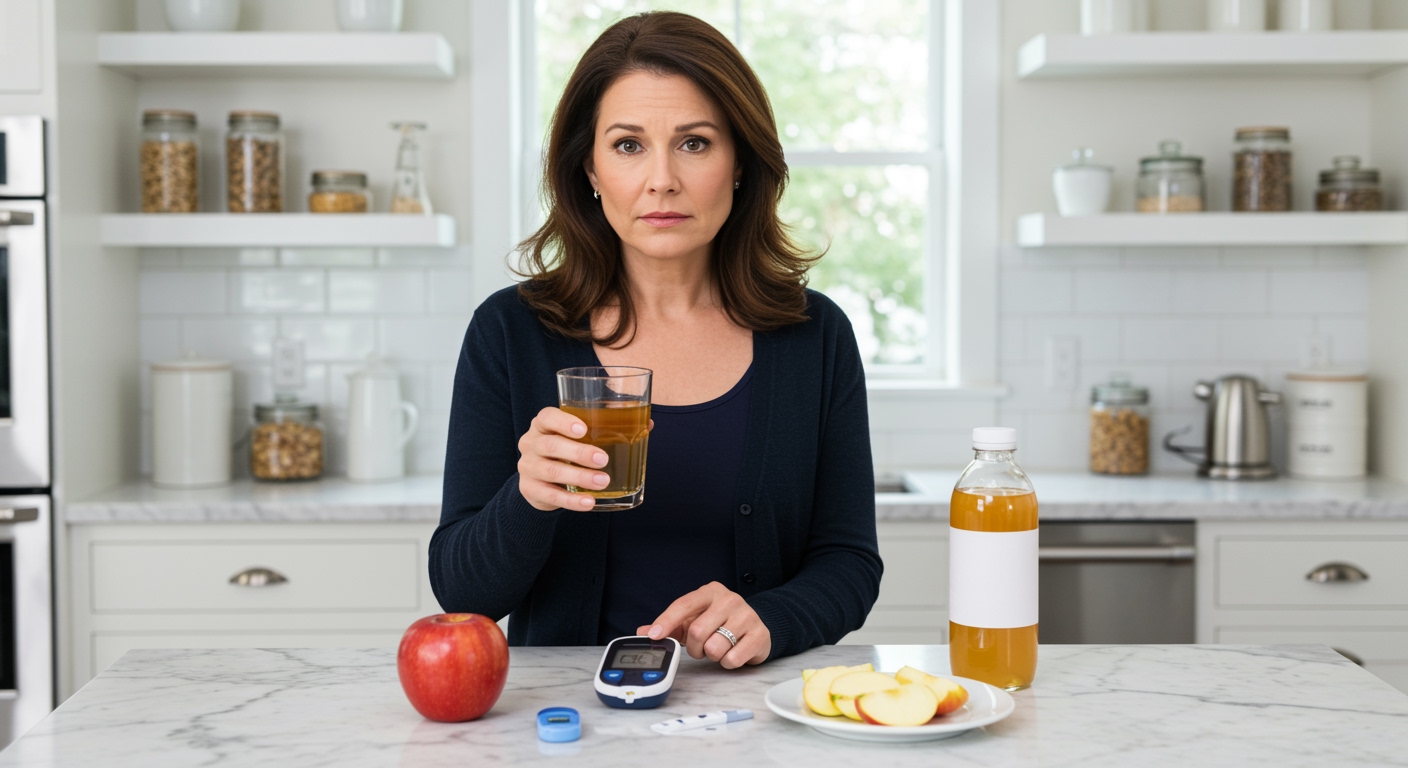✪ Key Takeaway: Apple juice is not good for diabetes because it causes rapid blood sugar spikes due to high sugar content and lack of fiber.
Introduction
You reach for that glass of apple juice thinking you made a healthy choice.
Many people with diabetes wonder if apple juice fits into their meal plan because apples are natural and seem like a better option than soda.
Hi, I’m Abdur, your nutrition coach and today I’m going to explain why apple juice can be problematic for diabetes management and what you should know before your next sip.
What Happens When You Drink Apple Juice?
Apple juice hits your bloodstream like a sugar bomb within minutes of drinking it.
Your body absorbs the concentrated sugars rapidly because the juice lacks fiber that would normally slow down absorption.
One cup of apple juice contains about 24 grams of sugar, which equals roughly 6 teaspoons of pure sugar.
This sugar load causes your blood glucose levels to spike quickly, forcing your pancreas to work overtime producing insulin.
For people with diabetes, this rapid rise can push blood sugar into dangerous territory above 180 mg/dL.
The glycemic index of apple juice ranges from 40 to 50, which means it raises blood sugar faster than whole apples but slower than pure glucose.
✪ Fact: It takes about 3-4 whole apples to make one cup of apple juice, concentrating all the sugar without the beneficial fiber.
How Does Apple Juice Compare To Whole Apples?
The difference between apple juice and whole apples is like comparing a sugar rush to a steady energy release.
Whole apples contain about 4 grams of fiber per medium fruit, which slows down sugar absorption and helps prevent blood sugar spikes.
When you eat a whole apple, the fiber creates a gel-like substance in your stomach that delays glucose absorption into your bloodstream.
Apple juice removes all this protective fiber during processing, leaving behind concentrated fructose and glucose that your body absorbs rapidly.
Research shows that people who eat whole fruits have a lower risk of developing type 2 diabetes, while those who drink fruit juices have an increased risk.
The chewing process also matters because it triggers satiety hormones that help you feel full, something that liquid calories cannot provide effectively.
✪ Pro Tip: Choose whole apples over apple juice to get fiber benefits and better blood sugar control.
Can Small Amounts Of Apple Juice Be Safe?
Small amounts of apple juice might be acceptable if you time it correctly and monitor your blood sugar response.
A 4-ounce serving contains about 12 grams of sugar, which is half the amount in a full cup.
Some people with diabetes use small amounts of apple juice to treat low blood sugar episodes because it raises glucose levels quickly.
The key is understanding your individual glucose response by testing your blood sugar before and after drinking juice.
If you choose to drink apple juice occasionally, pair it with protein or healthy fats to slow down sugar absorption.
Never drink apple juice on an empty stomach because this maximizes the blood sugar spike and can lead to reactive hypoglycemia later.
✪ Note: Always consult your healthcare provider before adding any fruit juice to your diabetes management plan.
What Are Better Alternatives For Diabetics?
Water remains the best beverage choice for people with diabetes because it has zero impact on blood sugar.
If you crave fruit flavors, try infusing water with fresh apple slices, cinnamon, or other natural ingredients.
Unsweetened tea and coffee provide antioxidant benefits without raising blood glucose levels.
For occasional treats, dilute a small amount of apple juice with sparkling water to reduce the sugar concentration while maintaining flavor.
Green smoothies made with leafy vegetables and small amounts of low-glycemic fruits offer nutrients without dramatic blood sugar changes.
Remember that developing a taste for less sweet beverages takes time, but your blood sugar control will improve significantly.
✪ Pro Tip: Gradually reduce sweet beverages over 2-3 weeks to retrain your taste buds without feeling deprived.
The Bottom Line
Apple juice is not a good choice for people with diabetes because it causes rapid blood sugar spikes without providing the fiber benefits of whole fruit.
Your beverage choices matter as much as your food choices when managing diabetes effectively.
I would love to hear about your experiences with fruit juices and blood sugar management, so please share your thoughts or questions in the comments below.
References
At NutritionCrown, we use quality and credible sources to ensure our content is accurate and trustworthy. Below are the sources referenced in creating this article:
- PMC: Fruit Juice Consumption and Risk of Diabetes
- Tarla Dalal: Glycemic Index of Apple Juice
- PMC: Dietary Patterns and Diabetes Risk
- Diabetes UK: Juice and Diabetes





